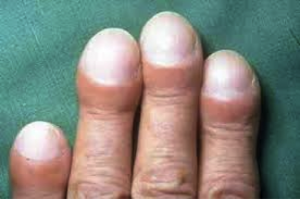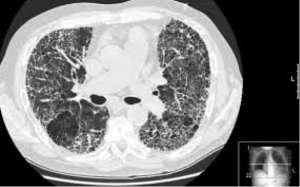Pulmonary (lung) fibrosis is more common in people with Dyskeratosis Congenita, and in some cases can be the first indication of the disease.
Pulmonary fibrosis can be life threatening and is usually looked after by specialist chest physicians. New drugs have shown great promise in treating pulmonary fibrosis; older treatments such as prednisolone are no longer used, since they are unhelpful and could even make things worse.

Clubbing of the nails, shown here, can be a sign of pulmonary fibrosis.
Treatment of conditions such as acid reflux (dyspepsia/heartburn) can also improve matters. External factors such as smoking, pollution and exposure to certain medications (busulphan, methotrexate, long term nitrofurantoin) may increase the risk. A full list of medications which should ideally be avoided is available at https://www.pneumotox.com/drug/index/
Guidelines for treating pulmonary fibrosis are available. Although these apply to all forms of pulmonary fibrosis, they are also applicable to those with dyskeratosis congenita.
CT scan showing pulmonary fibrosis.
Small abnormal blood vessels called ‘arteriovenous (AV) malformations’ can also be problematic and cause bleeding or shortness of breath and low blood oxygen. Early treatment with oestrogens, danazol or VEGF may be helpful. AV malformations may also contribute to pulmonary fibrosis. If liver transplant is required, AV malformations in the lungs often improve afterwards.
You can find DC Action’s lungs ‘Cheat Sheet’ here: Respiratory Oct 2023
You may find it useful to take this to your GP or specialist to help explain your symptoms.
References and Further Reading:
https://www.nice.org.uk/guidance/cg163
https://www.blf.org.uk/support-for-you/idiopathic-pulmonary-fibrosis-ipf

